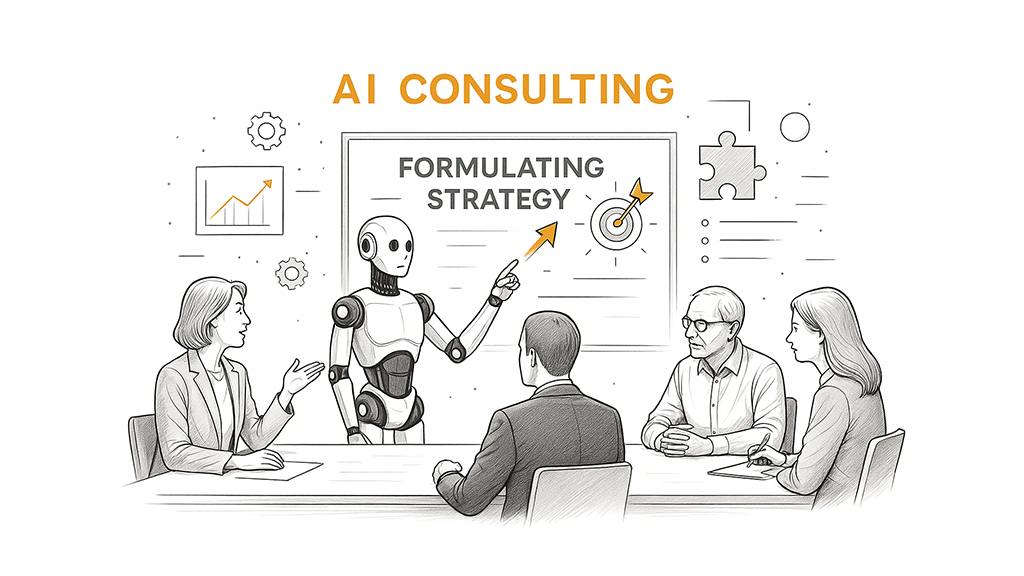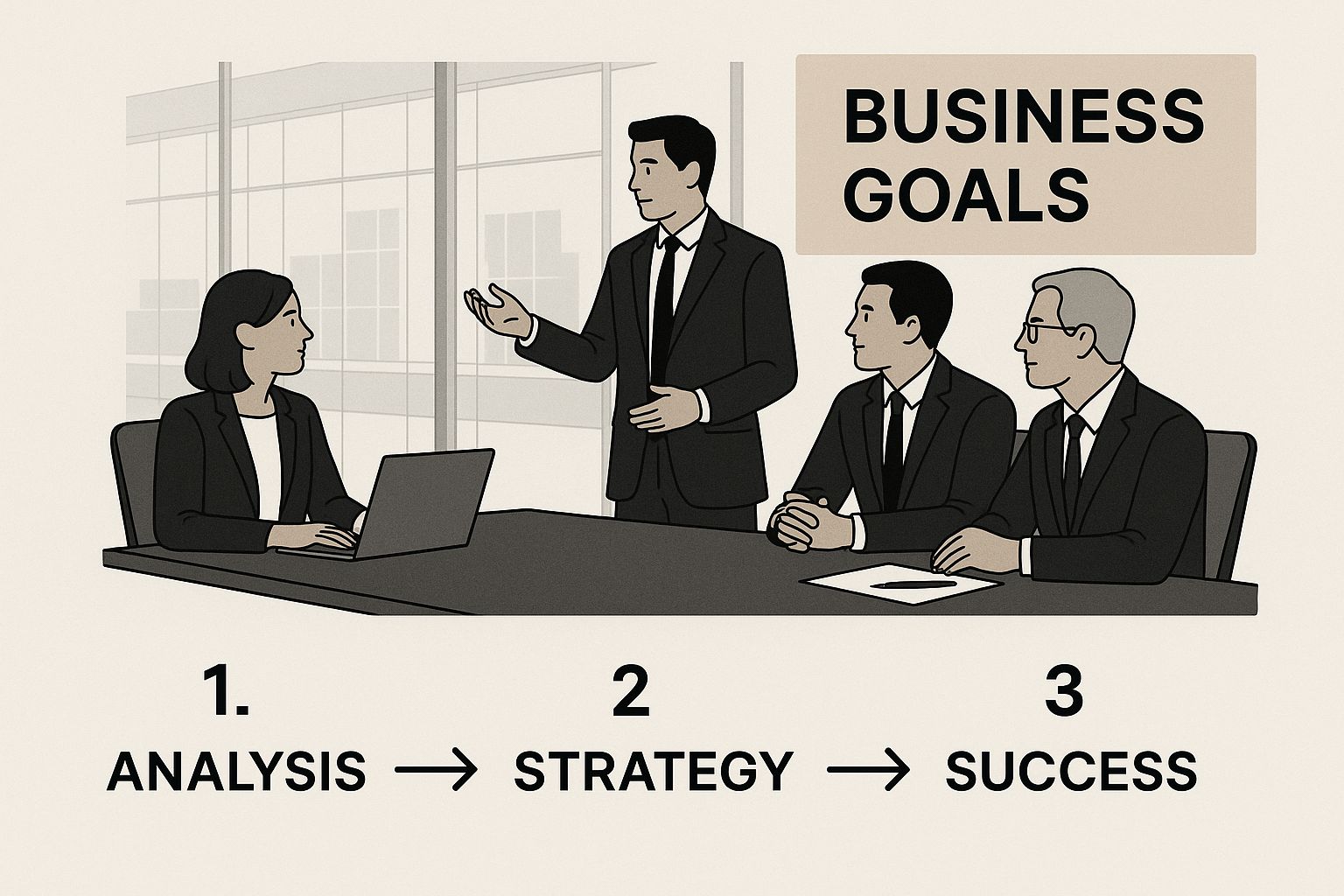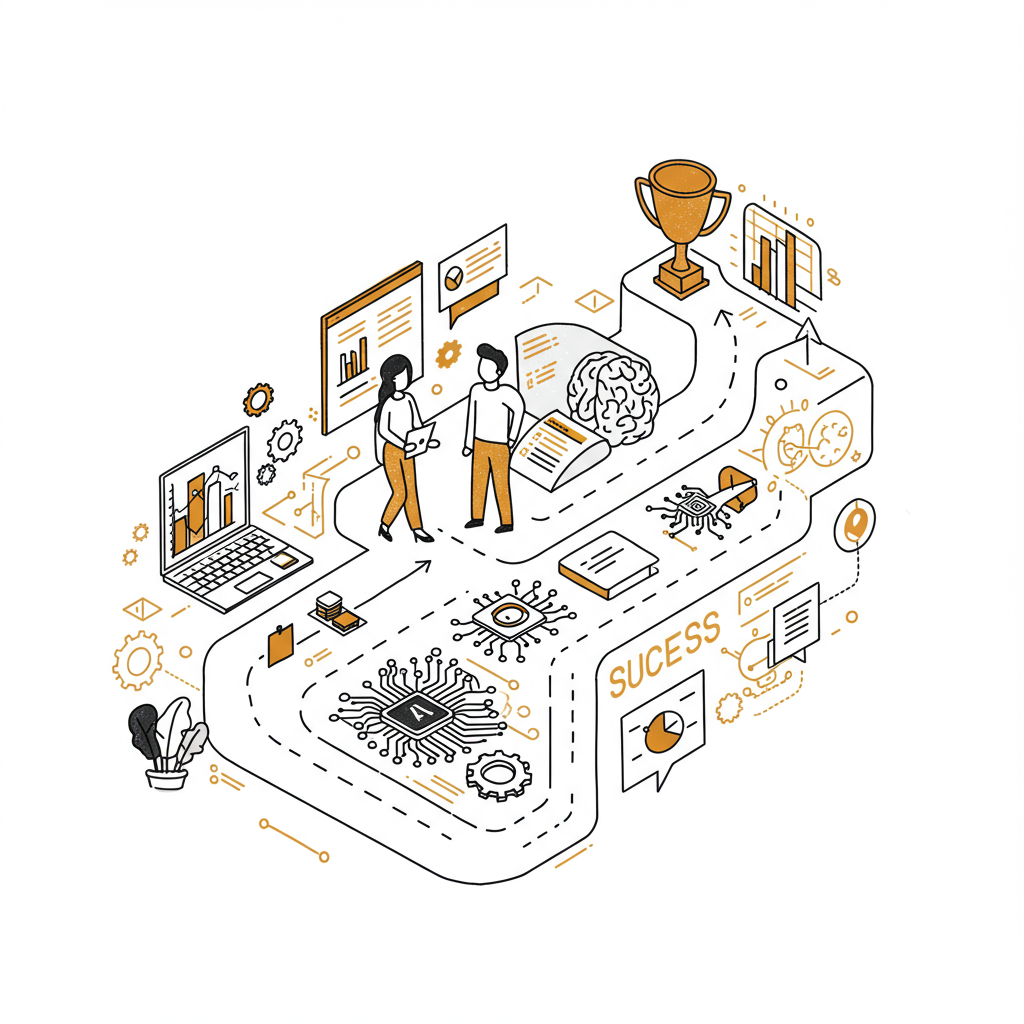AI Strategy Consulting: Drive Business Success Today
Discover expert ai strategy consulting to transform your business. Learn how our solutions can boost efficiency and innovation. Click now!

Why AI Strategy Consulting Is Nothing Like Regular IT Consulting
It's easy to group AI strategy consulting with traditional IT consulting, but that’s like comparing a city planner to a road repair crew. While both are crucial for a functioning city, their jobs are worlds apart. Regular IT consulting is about optimising, securing, and maintaining the systems you already have. It repairs the roads, fills potholes, and makes sure traffic flows smoothly on existing routes. It works within the known limits of your current business.
In contrast, AI strategy consulting is about designing an entirely new city. It doesn't just ask, "How can we make our current processes faster?" Instead, it digs deeper, asking: "What kind of business could we become, and what new problems could we solve if data and intelligence were our foundation?" This is where many organisations get it wrong. They see AI as another software update, a task for the IT department, which often results in costly pilot projects that deliver no real business value.
A Shift From Technical Fixes to Business Reinvention
The key difference is the starting point. An IT consultant might begin by looking at your current server capacity or software licences. An AI strategy consultant, however, starts by understanding your customers, your position in the market, and your biggest unsolved business challenges. Their focus is on finding opportunities for massive improvements or creating completely new revenue streams that were not possible before.
Imagine a logistics company. They might initially think of using AI just to automate warehouse sorting. An AI strategist would push them to think bigger. They would explore how predictive AI could completely reshape the supply chain to anticipate demand, reroute shipments before delays happen, and even create a new service for clients based on these predictive insights.
This strategic view is becoming more common. In the Netherlands, AI adoption is growing, with 22.7% of businesses with ten or more employees now using AI. This trend is especially noticeable in larger companies, where 59.2% have begun to integrate AI, compared to just 17.8% of smaller firms. This gap often shows the need for strategic guidance to get started. You can read the full report about AI adoption trends in Dutch businesses from CBS. Read more about transforming your Dutch business with AI strategy consulting.
To better understand this trend, here's a look at how AI adoption varies across different company sizes.
Company Size
AI Adoption Rate
Primary Applications
Key Challenges
Small (10-49)
17.8%
Marketing automation, Customer service chatbots
Lack of budget, Limited technical expertise
Medium (50-249)
35.5%
Process automation, Data analysis for insights
Data quality issues, Integration with legacy systems
Large (250+)
59.2%
Predictive analytics, Supply chain optimisation, R&D
Scalability, Finding skilled talent, Change management
This data clearly shows that larger companies are quicker to adopt AI, often because they have more resources to invest in strategic initiatives. However, the primary applications and challenges differ significantly, highlighting that a one-size-fits-all approach to AI does not work.
Beyond Automation to Strategic Foresight
In the end, the goal of traditional IT consulting is efficiency and stability. The goal of AI strategy consulting is to build a lasting competitive advantage. It goes beyond simple automation to create systems of intelligence that can learn, adapt, and offer a glimpse into the future. This requires a change in thinking from leadership—to view AI not as a cost to be managed, but as a strategic investment that will drive future growth and resilience.
Inside The AI Strategy Consulting Process That Actually Works
A good AI strategy consulting engagement is less like a one-off project and more like drawing up an architectural blueprint. It isn’t about quickly writing code; it's about carefully planning where to build, what materials to use, and making sure the final structure serves its purpose for years. A successful process systematically reduces the risk of your investment and connects every action to real business outcomes.
This infographic illustrates how effective consultants always ground their technical exploration in solid business goals, ensuring every step is purposeful.

As shown, the process begins by understanding the market and customer needs, which then guides the technology and data strategy, not the other way around.
Phase 1: Deep Discovery And Opportunity Mapping
The first phase is the most important and often the most insightful. A great consultant spends more time with your marketing, sales, and operations teams than with your IT department. They act like investigative journalists, aiming to uncover the core drivers of your business. Key activities include:
- Business Goal Alignment: Pinpointing your main objectives. Is the aim to reduce operational costs by 15%, enter a new market, or improve customer retention? The answer shapes all that follows.
- Data Readiness Assessment: Looking at not just the amount but the quality and accessibility of your data. This isn't just a technical check; it’s about figuring out if your data can realistically answer the business questions you’re asking.
- Use Case Prioritisation: Brainstorming a wide range of potential AI applications and then filtering them through a practical lens. Which ideas offer the highest value for the lowest effort and risk? A consulting engagement might find dozens of possibilities but recommend starting with just one or two high-impact pilot projects.
This discovery work produces a prioritised list of opportunities, each linked to a specific business metric. It gives a clear answer to the question, "Where should we start?". This AI strategy consulting tool efficiently does AI opportunity discovery through guided questions.
Phase 2: Pilot Design And The Viability Roadmap
Once the top opportunities are clear, the focus moves to creating a detailed plan of action. This is where the strategic vision meets operational reality. A consultant translates the "what" and "why" from the discovery phase into a concrete "how." This roadmap is more than a timeline; it's a complete guide. For example, if the goal is a predictive maintenance system, this phase outlines the required data sources, the type of machine learning model needed, the necessary team skills, and a budget.
A key deliverable here is a viability roadmap. This document lays out the steps for a small-scale pilot project designed to quickly prove the concept's value. It defines success, sets clear key performance indicators (KPIs), and establishes a stage-gate process. This ensures that the organisation doesn't commit to a massive, multi-year project without first confirming that the idea works and delivers measurable results. This practical, step-by-step approach turns abstract AI potential into an executable plan, preparing the ground for successful implementation and scaling.
Why Your Industry Changes Everything About AI Strategy
Trying to apply a generic AI solution to a specific industry problem is like using a standard city map to find your way through a dense jungle. While both are navigational tools, one is completely useless for the unique terrain of the other. This highlights a fundamental truth of AI strategy consulting: what works brilliantly in one sector can fail spectacularly in another. The most successful AI projects are built on a deep understanding of an industry’s specific challenges, regulations, and day-to-day realities.
Imagine a consultant with a strong record in manufacturing who focuses on using computer vision to make production lines more efficient. While impressive, that expertise is of little help to a financial firm that needs to build complex algorithms for fraud detection under strict regulatory rules. The data types, success metrics, and inherent risks are worlds apart. True industry expertise means the consultant already speaks your business language, which leads to faster project delivery and a much higher return on investment.
From Logistics to Healthcare: The Power of Specialisation
Think about the stark differences between sectors. An AI strategy consulting project for a logistics company will likely focus on optimising the supply chain, predicting maintenance needs for its vehicle fleet, and planning dynamic routes to save fuel and time. The key data points are delivery times, fuel consumption, and warehouse inventory levels. The main goal is operational efficiency and cost reduction.
Now, let's switch to a healthcare organisation. Here, the focus is entirely different. An AI strategy might involve analysing patient data to predict disease outbreaks, improving the accuracy of diagnoses from medical imaging, or creating personalised treatment plans. The data is highly sensitive and protected by strict privacy laws. The primary goal isn’t saving money, but improving patient outcomes. A consultant without a solid grasp of medical ethics, data privacy regulations, and clinical workflows would not only be ineffective but potentially dangerous.
This need for specialisation is changing the market. In the Netherlands, for instance, the AI consulting field is moving away from one-size-fits-all services and toward highly focused, industry-specific solutions. Dutch firms are building deep expertise in key sectors like logistics, agriculture, and healthcare because they recognise that AI's value is only realised when it is deeply connected to a specific business context. You can discover more about these AI consulting trends. And here is an insightful read into AI strategy consulting services in the Netherlands.
Spotting Genuine Industry Expertise
When you're evaluating potential consultants, it's vital to tell the difference between real industry knowledge and surface-level familiarity. A truly experienced consultant won't just talk about technology; they will discuss your industry's specific problems and opportunities in detail. To identify a true expert, ask targeted questions:
- What are the most significant regulatory hurdles for AI in our industry?
- Can you provide examples of AI projects you’ve led for our direct competitors or similar companies?
- How do you measure ROI for AI initiatives within our specific operational context?
- What unique data challenges have you encountered in our sector?
Their answers will quickly show their depth of understanding. A partner with proven sector experience doesn’t waste time learning the basics of your business. They arrive ready to apply their knowledge, speeding up your journey from a simple idea to a scalable, effective solution that gives you a real competitive advantage.
Navigating AI Regulations Without Killing Innovation
The rapid growth of AI has introduced a complex maze of new rules and ethical questions. For any business, this isn't just a legal issue; it's a strategic one. Getting ahead of compliance standards now is much smarter than reacting to them later. An expert in AI strategy consulting helps an organisation put strong systems in place that not only follow regulations but also keep it competitive. Imagine building a high-performance race car: you need a powerful engine for speed, but you also need effective brakes, a roll cage, and safety features to actually finish the race.

This regulatory climate is especially important in Europe. Legal frameworks are a critical factor shaping the AI strategy consulting environment in the Netherlands. The European Union's AI Act, which takes effect from August with a phased rollout, sets up a risk-based model for AI systems. This new law bans applications deemed harmful and imposes strict duties on high-risk AI, such as in recruitment or credit scoring. Forward-thinking companies are already building these principles into their AI development from the ground up. You can find more details on how the EU AI Act impacts Dutch businesses from Chambers and Partners.
Turning Compliance into a Competitive Advantage
Instead of seeing rules as a roadblock, smart companies and their consultants view them as a chance to build trust. A clear governance framework doesn’t have to slow things down. In fact, it can speed up development by giving teams clear guidelines. This proactive approach ensures your AI projects are built on a solid, ethical foundation that can adjust to future rule changes. Key parts of such a framework include:
- Algorithmic Transparency: This involves creating clear documents that explain how AI models arrive at their decisions. It's essential for satisfying auditors and building user confidence, answering the key question, "Why did the AI do that?"
- Data Privacy and Protection: Implementing strong data governance is crucial for protecting sensitive information, aligning with rules like GDPR. This means ensuring data is used ethically and securely at every stage.
- Human-in-the-Loop Oversight: This means designing systems where human experts can check, override, or fix AI-driven decisions, especially in critical situations. It provides accountability and lowers the risk of automated mistakes.
Building Resilient AI for the Long Term
A consultant's job is to help integrate these practices without crushing the creative process. For instance, a financial services firm might hire a consultant to design an AI-powered credit approval system. The consultant would help build a model that is not only accurate but also fair and transparent, with clear audit trails to prove it doesn't discriminate against certain groups.
This method changes compliance from a tedious checklist into a strategic advantage. By building AI that is responsible from the start, you not only steer clear of potential fines but also create products and services that your customers trust. This foresight makes sure that your AI investments are durable, adaptable, and able to deliver value as regulations evolve.
Spotting Great AI Strategy Consultants From The Pretenders
The market for AI strategy consulting is crowded, and not every advisor offers the same value. Picking the wrong partner can lead to wasted budgets, stalled projects, and a deep-rooted scepticism towards AI within your organisation. It’s like hiring a tour guide for a critical expedition; a pretender will point out obvious landmarks from a distance, while a true expert will lead you through hidden paths to discover unexpected treasures. The key is to separate genuine strategic partners from smooth-talking generalists.

A top-tier consultant’s worth isn't just in their technical knowledge but in their ability to connect that knowledge to your specific business outcomes. For instance, the global consulting firm PwC highlights the importance of aligning AI with business strategy and governance, a sign of a mature practice. A pretender, on the other hand, often gets lost in the technology itself, dazzling you with buzzwords like "neural networks" or "large language models" without tying them back to your profit and loss statement.
Decoding Credentials and Validating Track Records
To find a true expert, you need to look beyond a polished website and ask probing questions. A consultant’s real credentials are not their certifications but their history of successful, implemented projects. An honest conversation with business leaders who have worked with them is invaluable.
Here are some key areas to investigate when evaluating an AI strategy consulting firm:
- Case Studies with Measurable Outcomes: Ask for detailed case studies. Don't settle for vague descriptions. A great consultant can say, "We helped a retail client reduce inventory spoilage by 18% using a predictive demand-forecasting model." A pretender might say, "We helped a company with their data."
- Focus on Business Problems, Not Just Tech: During initial meetings, pay attention to where their questions lead. Do they ask about your customer churn rate, operational bottlenecks, and competitive pressures? Or do they jump straight to discussing cloud infrastructure and algorithms? The best consultants start with the problem, not the solution.
- A Clear, Phased Methodology: Ask them to walk you through their typical engagement process. A reliable partner will have a structured approach, often starting with a discovery phase, followed by a small-scale pilot project to prove value before you commit to a larger investment. This de-risks the process for you.
Red Flags and Incentive Alignment
Be cautious of consultants who promise a one-size-fits-all solution or guarantee results without understanding your business. Another red flag is a fee structure based solely on billable hours without any link to performance or outcomes. True partners, like those at firms such as Bain & Company or McKinsey, structure engagements to ensure their incentives are aligned with your long-term success, not just their short-term profits. They are invested in seeing your organisation build its own AI capabilities. Platforms like Ekipa AI even offer a new model, providing rapid strategy and execution pathways without the traditional high costs, putting the focus squarely on delivering impact.
Measuring AI Success Beyond The Hype
After dealing with regulations and choosing the right partner, the final and most important step is to measure what truly matters. A successful AI project delivers real business impact, but many organisations get distracted by vanity metrics that sound impressive but don’t drive value. For an AI strategy consulting engagement to be worthwhile, it must be accountable for clear, predefined business outcomes. It’s like training for a marathon; tracking your speed in the first kilometre is interesting, but what really counts is your overall race time.
The excitement around AI can lead to a focus on technical achievements, like model accuracy percentages. While an accuracy of 95% on a predictive model sounds great, it’s meaningless unless it leads to a concrete business improvement. This could be a 10% reduction in customer churn or a 15% increase in operational efficiency. True success lies in connecting the technical outputs to the financial and operational health of the business.
Establishing Meaningful Baselines
Before you can measure improvement, you need to know your starting point. A key role of AI strategy consulting is to help you establish these baselines. This goes beyond simply looking at high-level numbers; it involves a detailed analysis of the specific processes the AI project will affect. For instance, if the goal is to improve supply chain efficiency, you need to know the baseline for delivery times, fuel costs, and warehouse errors before the project begins.
Without these benchmarks, calculating the return on investment (ROI) becomes guesswork. This makes it difficult to justify further investment or expand the project. It's important to set realistic expectations. AI often delivers value incrementally, so it's about balancing quick, demonstrable wins with long-term strategic goals that might take longer to materialise.
Frameworks for Sustained Performance
To make sure AI projects don’t lose steam after the initial excitement, a solid accountability framework is necessary. This framework should be designed collaboratively during the strategy phase and include several key components:
- Key Performance Indicators (KPIs): These should be a mix of leading and lagging indicators. Leading indicators, like the adoption rate of a new AI tool, can predict future success. Lagging indicators, such as quarterly profit margins, measure the ultimate impact.
- Regular Review Cadence: Set up regular, structured reviews with all stakeholders to check progress against the agreed-upon KPIs. This creates a continuous feedback loop for refining both the AI models and the overall strategy.
- Ownership and Accountability: Clearly define who is responsible for tracking each metric and reporting on progress. This ensures that someone is always focused on driving the project towards its goals.
By moving beyond the hype and focusing on measurable, business-centric results, you can ensure your AI investments deliver lasting value. This disciplined approach separates projects that create a real competitive advantage from those that are just expensive experiments.
Building Your AI Team For Life After The Tutors Leave
The most valuable result of any AI strategy consulting partnership isn't a final report or a pilot project. It's your organisation's ability to keep innovating on its own. A great consultant works to make themselves unnecessary, acting more like a skilled tutor who teaches you how to solve the problem, rather than just doing your homework for you. The aim is to build your internal skills so that AI becomes a self-powering engine for growth, long after the consulting contract ends.
This move from dependency to self-reliance is a planned process. Top consultants design their engagements to transfer knowledge, develop skills, and set up a governance model that lets your AI strategy grow alongside your business.
Data from McKinsey shows that high-performing companies don't just use AI; they embed it deeply by building talent and reskilling their workforce. This research highlights that leading organisations are almost three times more likely than their peers to have active reskilling programmes, showing a clear connection between talent development and AI success.
Creating Your Internal AI Engine
To keep the momentum going, the focus must shift to creating a permanent, in-house AI function. This doesn't mean you need to hire an army of PhD-level data scientists overnight. It's about forming a cross-functional team that can carry the torch forward.
- Establish an AI Centre of Excellence (CoE): This is a central, cross-functional group responsible for AI strategy, governance, and best practices. It should include experts from business, data science, IT, and security. The CoE makes sure all AI projects align with business goals, stick to ethical standards, and are rolled out responsibly.
- Develop Cross-Functional AI ‘Squads’: For individual projects, put together small, agile teams that combine different skills. A typical squad might have a product manager, a data analyst, a machine learning engineer, and a business-line expert. This setup ensures that AI solutions are not only technically solid but also fix real business problems.
Fostering Widespread AI Literacy
Beyond the core team, it's crucial to raise the AI literacy of the entire organisation. When more employees understand the basics of AI, they can spot new opportunities and add to the innovation process. This builds a culture where AI is seen as everyone's tool, not just the domain of a few specialists. Practical steps include:
- Hands-on Workshops: Offer structured training and workshops to teach teams about AI concepts and how they apply to their specific roles.
- Clear Documentation: Make sure the consultants leave behind thorough documentation for all models and processes, making it easier for your team to take over.
- Ongoing Mentorship: Some consulting models include continuous coaching to support your CoE as it faces new challenges and refines its strategy.
The final goal of AI strategy consulting should be empowerment. It’s about giving your organisation the knowledge, tools, and structure to not only manage the AI solutions you’ve built but also to dream up and create the next ones.
Ready to build an AI strategy that delivers lasting value and empowers your team for the future? Ekipa AI provides the expert guidance and execution power to turn your AI vision into reality, fast.



